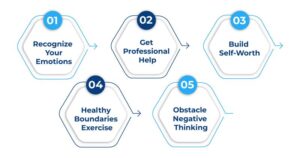Abandonment trauma occurs when the individual experiences a deep fear of being unattached or being discarded, and usually occurs due to some painful memories in the past. It may originate in neglect during childhood, loss of a loved one, or poor relationships. Individuals with this trauma can become insecure, over attached, or anxious about the loss of the people they love.
Similarly, these emotions could influence the relations, self-esteem, and emotional well-being. It is important to understand the signs early enough and seek help in recovery. It is possible to heal with the help of appropriate care, including lifestyle changes or medications. Read on to learn the causes, effects, and treatment of abandonment trauma.
What Are Abandonment Issues?
Abandonment issues are the fear of being all alone or left by people whom you love. These fears often start with prior experiences, i.e., the loss of a loved one, parents separating, or a lack of attention and caring as a child. People with abandonment issues may have problems with anxiety in relationships, worry excessively about being discarded by other people, or over-attach when fearing that they are not alone.
It can reach friends, love relations, and even family relations. An individual who is afraid of abandonment becomes stuck-up, and they can excessively think of an insignificant problem, become insecure, or, in some cases, reject any involvement with people to make them more comfortable against any hurt. Healthy, understanding communication can help people learn how to deal with these fears and have more trusting relationships.
Childhood Abandonment Trauma
Childhood Abandonment trauma is the situation where the child feels unloved or unwanted by the individual. They are dependent upon someone like a parent or a caregiver, and are abandoned. This could be as a result of a parent leaving, neglect, divorce, or even the emotional absence of a parent, though they have a physical presence. Children who are involved in these types of cases may be scared, have a lack of love, or be unhappy, and this can have far-reaching effects on their perceptions of relationships in the future.
In addition, the inability to overcome this trauma can lead into adulthood. It can result in fear of being deserted, or one can lack trust towards others, or can be overly dependent in a relationship. Such early trauma of abandonment might also lead to grave self-opinion, a sense of anxiousness, or a relationship with other individuals in fear of being rejected. Healing of this trauma will comprise therapeutic sessions, learning to trust, and self-confidence.
Abandonment Trauma Symptoms
The symptoms of abandonment trauma could include the following:
- Constant worry of being left alone or rejected.
- Low morale and lack of self-worth.
- Diminishing ability to create sound relational boundaries.
- Steering clear of emotional intimacy to avert potential hurt.
- Moodiness, rage, or emotional tantrums.
- Inability to trust people, even where there is safety.
- Always requires attention and confirmation.
Signs of Abandonment Trauma in Adults
The following are the symptoms of abandonment trauma among adults:
- A challenge when relating to others.
- The insecurity or unworthiness of love.
- Anticipating all the little conflicts or behavioral shifts.
- Becoming over-reliant or co-dependent in a relationship.
- Avoiding closeness to avoid possible pain.
- Severe green-eyedness or envy.
- Meltdowns or unease when feeling unheard.
- Inability to stay in long-term relationships.
What Causes Abandonment Issues?
The reasons behind the abandonment issues may be as follows:
- Loss of a parent through death, divorce, or separation.
- Primary ignorance or unemotional parenting.
- Having grown up with emotionless parents.
- Experiencing physical, emotional, or sexual abuse.
- Adult relationship traumatic split-ups/ betrayal.
- More frequent incubations of rejection or being left out.
- Existing in volatile/unstable home environments.
How To Deal with Abandonment Trauma?

1. Recognize Your Emotions
In the stage of overcoming abandonment trauma, the foremost thing to be done is to believe and make yourself familiar with the feeling, as opposed to sweeping the rug. Capitalize on the fact that it may be fear, sadness, or anger as a reaction to what they have experienced as a normal reaction. You should not judge yourself because of experiencing these feelings, as they are a part of your healing journey.
2. Get Professional Help
Psychotherapy can assist in locating a safe zone to work through abandonment experiences of the past. A qualified specialist can teach you how to identify triggers and challenge the negative thoughts, and develop new and more constructive coping behaviors. Under therapy, the anxiety subsides, and you will be able to learn how to have healthier and more secure attachments.
3. Build Self-Worth
The relevance of the need to elevate your self-esteem in the quest to overcome your fear of being deserted cannot be underestimated. Emphasize your strengths and accomplishments, and focus on positive characteristics and not on shortcomings. The prouder you are of yourself, the less you will need to have other people validate you. Positive self-esteem will also make you feel safe when a relationship hits a rough patch.
4. Healthy Boundaries Exercise
Boundaries help maintain your emotional well-being and keep you up to date in your relationships. Please find out how to use the tools to explain to others what you want and how to say no, when necessary, without having to feel bad about doing it. Respecting other people’s boundaries is also essential to developing trust with one another. Boundaries assist in preventing over-dependence and fear of neglect.
5. Obstacle Negative Thinking
Abandonment trauma is likely to guise an individual with predispositions of being rejected even where there is no confirmation of the same. You must know how to spot and dispute this negative thinking so that they do not permeate their actions. Anxiety may also be reduced by mindfulness and affirmative phrases.
Impact Of Abandonment Trauma in Relationships
Relationships are then that much more anxious and stressful when there is abandonment trauma in the way. In our case, a man or a woman, having seen such a tragedy, may always fear that his/her partner will leave her/him without any reason. Others, on the contrary, may avoid intimacy so that they do not get hurt and therefore cultivate emotional detachment in relationships.
After abandonment trauma, the consequences are misunderstandings and conflicts in most cases. The person can misinterpret small indications, which they see as a refusal, quarreling, or disengaging. They may not be able to trust freely, and it becomes hard to achieve a wholesome, good bond. Self-awareness, a reasonable talk, and sometimes professional consultations can help individuals out of such routines and build healthier and more supportive relationships.
How To Heal Abandonment Trauma?
The healing process of the abandonment trauma will start with acceptance and awareness of what has occurred. What should be comprehended is that your feelings have been genuine and that the pain that you felt was nothing counterfeit. Healthy coping skills may be built, and trust may be achieved through the assistance of a therapist or counselor in processing painful memories. The healing process also includes self-care, supportive relations, and patience with myself.
Some tips on abandonment trauma healing are as follows:
- Find time to love yourself and remember your worth.
- Sear and change relations with people into positive, good, and encouraging ones.
- Use barriers to ensure that your emotional status is properly covered.
- There is nothing so bad about thinking negatively; reverse it to a positive thought.
- Find a treatment or support group where you can share and heal.
Effects of Abandonment Trauma
Here are some of the effects of abandonment trauma:
- Poor self-image and uselessness
- Inability to trust other people in relationships
- Being emotionally dependent on other people
- Difficulty showing emotions or feeling numb
- Having healthy boundaries issues
- Prevent hurts by not forming close relationships
- Sadness or feeling down that is persistent
- Difficulty controlling emotions in problem-solving
Treatment Options for Abandonment Trauma
1. Initial Assessment
In the initial stage of treating abandonment trauma, a mental health professional conducts the initial assessment, meaning that they will talk to you about how you feel, what happened in your past, and what you struggle with emotionally. This helps determine the extent to which trauma has influenced you and the support you might require.
2. Abandonment Trauma Test
Professionals commonly apply an abandonment trauma test to assess how severe your fears, triggers, and emotional patterns are about abandonment. They can use questionnaires or interviews to understand what is happening on the mental and emotional level.
3. Medication Management
Medical treatment may also contribute significantly to the process of treatment, especially in cases where the trauma could be associated with anxiety, depression, among other mental disorders. A psychiatrist can prescribe medication that, in turn, will help stabilize the mood, diminish the anxiety, and make you feel better in general.
End Note
At MAVA Behavioral Health, we will provide care for your abandonment trauma with a personal touch of medication management. Our qualified psychiatrists evaluate the symptoms, mood triggers, and mental health history of each patient to develop an individual approach on the way to successful treatment. Medication can also calm the anxiety, ease the depression, and stabilize the mood to work through the past experiences. We aim to provide patients with additional confidence, greater stability of emotions, and the ability to restore confidence in relationships and everyday life through patient care.
FAQs
What is abandonment trauma?
Abandonment trauma occurs when someone close to you, physically or emotionally, abandons you during childhood, thus causing emotional distress. It may have an impact on relationships, self-worth, and trust in future life.
What are typical symptoms of abandonment?
Fear of rejection, an inability to trust others, low self-esteem, overdependency in relationships, and an avoidance of closeness due to a fear of emotional pain are common.
Is healing of abandonment trauma possible?
Yes, abandonment trauma is curable using therapy, support groups, and at times medication to curb the anxiety or depression following the trauma.
How does medication play into the healing of the abandonment wounds?
Medication can also be taken to ensure that the symptoms that occur, including anxiety, mood swings, as well as depression, are minimized and that there is the capability to focus both on the therapy and the emotions that are being healed.
What is the timeline of the abandonment trauma recovery?
The period of trauma and unleashing of the emotional scarring varies in different individuals depending on the magnitude of the damage, the coping skills, and the type of treatment the individual has gone through.









